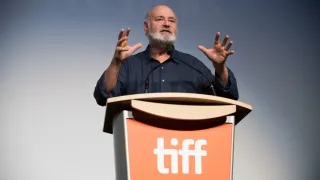January 7, 2018
2018 in Bay Area Art Museums
Sura Wood READ TIME: 4 MIN.
The country may have been taken over by philistines eager to cut funding for the NEA and other arts organizations they deem wasteful or nefarious, but at least for the Bay Area in 2018, there's reason for guarded optimism. The profoundly moving, not-to-be-missed "Revelations: Art from the African American South" continues its run at the de Young through April 1, and you still have a chance to catch LaToya Ruby Frazier, a gifted photographer whose affecting body of work in Pier 24's "The Grain of the Present" documents the decline of her hometown of Braddock, PA. Expect more art exhibited in unconventional spaces this year, and the imminent commencement of the Asian Art Museum's $90 million expansion project, which includes a new, 13,000-sq.-ft. pavilion, art terrace, and areas dedicated to contemporary art. Though construction won't be completed until summer 2019, the museum will remain open.
Speaking of AAM: If the answer to Santa's question "Have you been naughty or nice?" was the former, not the latter, you might get a sense of what's in store for you in "A Guided Tour of Hell." Drawing on graphic novels and Tibetan tradition, Pema Namdol Thaye's paintings of tormented beings consigned to fantastical, sometimes fiery underworld landscapes take visitors on a harrowing journey, with the Buddha of Hell leading the descent. (Apr. 20-Aug. 12)
The GLBT History Museum kicks off with "How Has Hollywood (Mis) Represented Homosexuality?" The lecture and discussion, led by queer culture historian Jim Van Buskirk, explores Tinseltown's depiction of LGBT characters through clips and trailers from 1960s and 70s mainstream movies. (Jan. 18, 7p.m.) Upcoming exhibitions include: "Angela Davis: OUTspoken," which delves into the turbulent times and controversial career of the scholar, activist, philosopher and queer black political leader. (Feb. 9-May 21) After years of drag queens grabbing all the glory, "Kingdom: Where Drag Kings Reign" flips the switch, shining a light on the less-familiar realm of female performers who present themselves as men (June-Sept.)
Museum of the African Diaspora: "EN MAS' Carnival and Performance Art of the Caribbean" examines the influence of masquerade traditions on contemporary art and their connection to the history of slavery and colonialism, the civil rights movement and migrations of the last century. (Through Feb.) "After the Thrill is Gone: Fashion, Politics and Culture on Contemporary South African Art" showcases the work of 14 artists channeling the socio-cultural climate of post-apartheid South Africa. (April-July)
SFMOMA: "Designed in California" focuses on the Golden State's human-centered, socially conscious, politically aware design trends driven by on-the-cusp technologies since the advent of the digital revolution. (Jan. 27-May 27) "The Train: RFK's Last Journey" features a trio of works that capture, from different perspectives, the funereal voyage of Robert F. Kennedy's body from NYC to Washington, DC, and the spectators who lined the railroad tracks as it passed by. (Mar. 17-June 10) Ladies and gentlemen, get your black derbies ready for "Rene Magritte: The Fifth Season," which centers on the artist's late paintings (1943-67), displayed in nine galleries each zeroing in on a major series or visual theme. (May 19-Oct. 28) Part fiction, part natural history doc, part cinematic essay, part intimations of mortality, John Akomfrah's three-channel video installation "Vertigo Sea" is a whimsical odyssey ruminating on the relationship between water and the unconscious. (Mar. 3-Sept. 16)
de Young Museum: Though some might say that "Contemporary Muslim Fashion" is an oxymoron, the premise of this unusual exhibition is that women readily associated with the burka and traditional garments that cover them head-to-toe, and those who've opted out have become trendsetters within and beyond their communities. The show promises insights into how they're regarded by the international fashion industry, and how they see themselves. (Sept. 22- Jan. 6, 2019)
Legion of Honor: "Casanova: The Seduction of Europe" imagines the resplendent, decadent world of the 18th Century's most notorious lothario, a man of insatiable appetites who was also a gambler, a spy, scandalous memoirist, and voracious traveler, when he wasn't bent on sexual conquest and gratifying his carnal desires. The show's 80 works - paintings, sculptures, period furnishings and lavish costumes of the era - help recreate the reprobate's opulent milieu of masked balls, palaces and grand opera houses. (Feb. 10-May 28) "VertiGhost," Lynn Hershman Leeson's intriguing installation and film, interweaves the stories of two paintings inextricably linked with FAMSF's collection: Modigliani's "Pierre-Edouard Baranowski" (ca. 1918), once thought to be a fake, and the mysterious "Portrait of Carlotta," an integral fictional plot-point and prop for Hitchcock's thriller in which the museum played a bit part. (Through Mar. 25) Julian Schnabel's audacious paintings and three relatively recent bodies of work inform a site-specific exhibition that includes Rodin sculptures from the museum's collection. (April 21-Aug. 5) "Truth and Beauty: The Pre-Raphaelites and the Old Masters" juxtaposes artworks by members of 19th-century England's Pre-Raphaelite brotherhood, who were inspired by the Italian Old Masters and pre-High Renaissance art of the Netherlands. (June 30-Sept. 30)
Contemporary Jewish Museum: "The Art of Rube Goldberg" assesses the career of the San Francisco-born-and-raised cartoonist with attendant photographs, early animations, selected comic strips such as Lala Palooza and Boob McNutt, and original invention drawings of the inordinately complicated contraptions for which he's both famous and often ridiculed. (March 15-July 8) The creative life of influential Jewish tattoo artist "Lew the Jew" is the subject of a show of the same name whose materials and artistic correspondence come from the collection of SF tattoo legend Don Ed Hardy. (July 25-Nov. 18)
BAMPFA: Vast in scope, "Way Bay" is a sweeping, which is to say very large, multi-disciplinary, historical portrait of the Bay Area's artistic legacy with a strong avant-garde/experimental cinema component, archival interviews with local artists, and an impressive contingent of new acquisitions. Emphasizing the frequently unheralded contributions of women and people of color, the exhibition begins with artifacts from the indigenous Ohlone culture, and covers the region from the mid-19th century, when it was a multicultural commerce hub, through the innovative powerhouse it has become today. Joan Brown, Bruce Conner, Jay DeFeo, Richard Diebenkorn, Chiura Obata and Erica Deeman, as well as lesser-known artistic voices, are represented. (Jan. 17-May 6)






